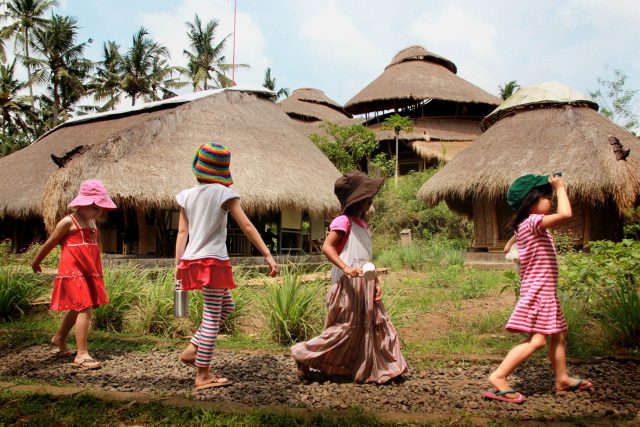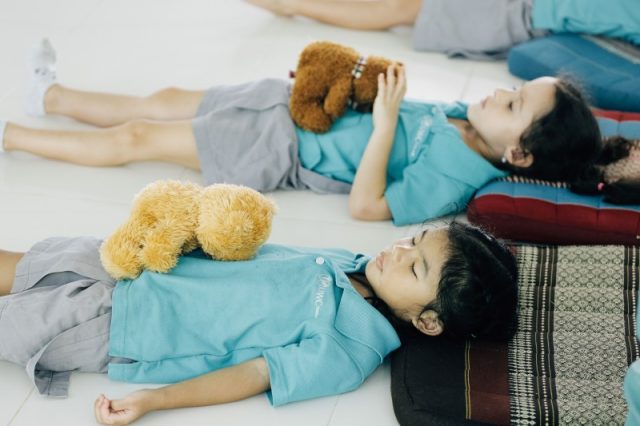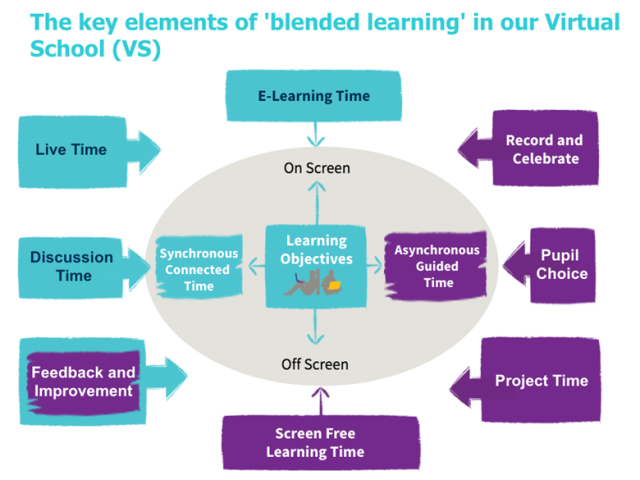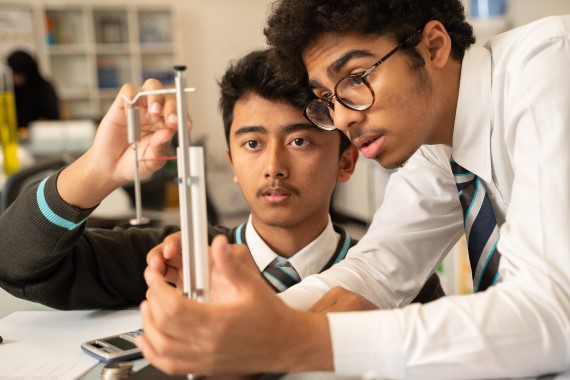Our partnered schools around the globe are actively contributing to the future of global education and strive towards building environments that support innovation and allow creativity to flourish. Take The Green School, Bali and The British School, Muscat for example, both recently included in the World Education’s report on Schools of the Future and recognised for meeting their outlined “8 characteristics of learning content and experiences.” Beyond test scores–although they are all high ranking–our partnered schools are driving international education forward and creating a new paradigm of education as we know it.
What are the characteristics of a leading school?
The World Economic Forum produced a report this year titled the “Schools of the Future”, calling for education systems to adapt models that equip children with “the skills to create a more inclusive, cohesive and productive world.” The report claims education systems have become “disconnected from the realities and needs of global economies and societies” due to the advancements in globalization and technology transforming the way the world works. As a response, they have created a framework and report for the future of schools: a collaborative effort from policymakers and educators. The report looks at how education needs to change and highlights schools that are leading the way.
The below characteristics represent a pioneering mindset and aspirational approach to the world of learning we are lucky enough to see through our schools everyday. Schools that look beyond textbooks to promote both social and planetary development and cohesion.
8 characteristics of high-quality learning, from the WEF report. Aptly coined as “Education 4.0:”
1. Global citizenship skills: Include content that focuses on building awareness about the wider world, sustainability and playing an active role in the global community.
2. Innovation and creativity skills: Include content that fosters skills required for innovation, including complex problem-solving, analytical thinking, creativity and systems analysis.
3. Technology skills: Include content that is based on developing digital skills, including programming, digital responsibility and the use of technology.
4. Interpersonal skills: Include content that focuses on interpersonal emotional intelligence, including empathy, cooperation, negotiation, leadership and social awareness.
5. Personalized and self-paced learning: Move from a system where learning is standardized, to one based on the diverse individual needs of each learner, and flexible enough to enable each learner to progress at their own pace.
6. Accessible and inclusive learning: Move from a system where learning is confined to those with access to school buildings to one in which everyone has access to learning and is therefore inclusive.
7. Problem-based and collaborative learning: Move from process-based to project- and problem-based content delivery, requiring peer collaboration and more closely mirroring the future of work.
8. Lifelong and student-driven learning: Move from a system where learning and skilling decrease over one’s lifespan to one where everyone continuously improves on existing skills and acquires new ones based on their individual needs.
Responses to global education during a pandemic
As 2020 draws to a close, we particularly want to commend our schools responses to international education in the time of a global pandemic and want to showcase their resilience, adaptability and force. Whether this inspires you in your search for your next international school job, allows you to reflect on the state of education today or fuels some action for an education system of tomorrow; just sit back while we share some highlights from our leaders in international education inline with the skills and learnings outlined above.
Real life application of skills and learning
We’ve picked a few of the WEF characteristics and found some real life applications of these values in our schools:
The Green School, Bali: Lifelong and student-driven learning

As mentioned, the Green School Bali was commended for living and leading on these 8 values, and we couldn’t agree more. Real-world application of global and local issues sets the group of Green Schools apart. The physical environments themselves represent a cohesion with the natural world that they promote to students and parents. They describe direct immersion with the natural world as a way for students “tap into their curiosity, empathy & creative thinking skills.” They live their message.
Highlight:
Our recent highlight from Green School, Bali in 2020, aligns with WEF report point 8: Lifelong and student-driven learning. The Green School, Bali has a programme called The Bridge which is a space on their campus for parents and adults to learn, co-work and attend workshops so they are also continually learning. Recently, Green School flipped the Bridge into a student take over : “In a series of student moderated talks and discussions, community members will be lead through a journey of self-reflection on their commitment to, and action on making our world sustainable.” An apt way to promote lifelong learning, involving both students and parents and creating a refreshing leadership example.
View this post on Instagram
Dulwich College: Global Citizenship
Point 2 in WEF’s report was in regard to global citizenship. Most of our schools are leading in this department, so picking a school to highlight has been difficult. Our School Group, Dulwich College, stands out. Their head of sustainability, d’Arcy Lunn, tells us how and why they embody global citizenship in their schools:
“Our motto at Dulwich is ‘Graduate World-wise’. Global citizenship isn’t best learnt from a book or watching a video, it needs time, thought, reflection and practice. At Dulwich we provide connected learning experiences that establish essential mindsets and attitudes towards global citizenship. Then, a curated progression of approaches, behaviours and best practices are developed over time. For example, this shows up as ‘bee advocacy’ with Year 1 students or aligning Global Goal targets to a Year 11 physics class. Everything we do can be seen as personal contributions to a collective context of the Sustainable Development Goals.
Highlight:
Last year, Dulwich College was in the Guinness Book Record for Largest Environmental Sustainability Lesson.
Dulwich College’s dedication to sustainability is apparent through their commitment of over 3000 students participating in the world’s largest environmental sustainability lesson on Wednesday October 30th 2019, which made the Guinness Book Record for Largest Environmental Sustainability Lesson. On their website they described the importance of the largest lesson: “the lesson demonstrated the importance of environmental protection and conveyed the message that each person can and should effect tangible positive change.”
United World Colleges: Accessible and inclusive learning
Accessible and inclusive learning is described in the WEF report as a “Move from a system where learning is confined to those with access to school buildings to one in which everyone has access to learning and is therefore inclusive.” United World Colleges and their outdoor education program in Thailand is one example of this. Rob Carmichael, head of Outdoor Ed. at UWC Thailand described a recent outdoor education Kayak trip…
“It’s truly awesome to see the level of commitment and effort that these kids give every single time on the water.Their paddling skills are always improving and the teamwork, communication and love of learning is second to none!”
View this post on Instagram
Additionally, UWC Thailand, recently celebrated an award by World Education Week for their Mindfulness Program. I know we have added them twice in here but we couldn’t ignore this feat. Their comprehensive and dedicated wellness programme also includes a vast amount of resources from classroom activities to tools for parents.

British School Muscat. Personalised and self-paced learning
British School Muscat, in Oman was featured in the WEF report for representing the 8 key values and learnings of a school of the future. One particular point that stands out to us among BSM’s wealth of attributes is their commitment to personalised and self based learning. Described as “moving from a system where learning is standardized, to one based on the diverse individual needs of each learner, and flexible enough to enable each learner to progress at their own pace” BSM personifies this by allowing each student to pursue their individual passions and interests.
The WEF describes why they commended the school in their report:
“This school’s curriculum focuses on discovery learning, an approach where multiple subjects are integrated into collaborative projects focused on the experience rather than the final product or answer. This interdisciplinary approach enables students to draw interlinkages between various content areas and focus on the specific skills to apply that content to the real world. The school is collaborating with the Government of Oman to train teachers throughout the country in this methodology.”
Highlight:
Their “Award Winning” Learning Ethos and Internship Programme has been recognised and the are often highlighted for their efforts. In 2019 they won International School of the Year 2019 at the #ISAwards2019 in London.
Nord Anglia Education. Innovation and creativity skills
Nord Anglia Education, one of our Schools Groups is leading in the innovation and creativity category for their virtual schools. Innovation and creativity skills are described in the WEF report as: “content that fosters skills required for innovation, including complex problem-solving, analytical thinking, creativity and systems analysis.”
Nord Anglia has reacted to Covid times with a robust virtual learning programme that takes a holistic and human-centred approach.
The Nord Anglia school group’s Virtual school is a great example of utilising both synchronous and asynchronous time with students. This means both connected time with a teacher and student where discussions, assessments, feedback can take place, and then the asynchronous time where screen-free, student choice and their projects are included in the timetable.

Highlight:
Additionally, their innovative approaches are deeply rooted in their commitment to a global mindset. Their latest video showcases a student’s journey to university . Lily – NAIS Pudong alumnus and psychology major now at the University of Michigan reflects on the IB programme and transferrable skillset that she uses every day.
Inspired by our amazing partnered schools? Join our community of teachers and get access to hundreds of teaching opportunities in some of the best schools and most exciting countries around the world. Join free!



